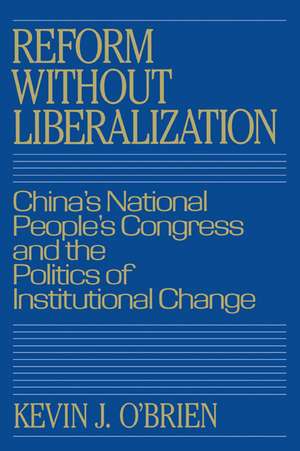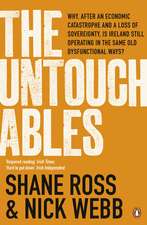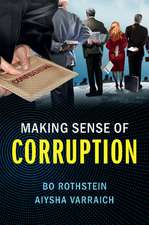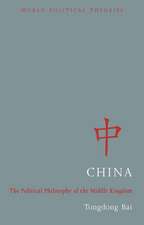Reform without Liberalization: China's National People's Congress and the Politics of Institutional Change
Autor Kevin J. O'Brienen Limba Engleză Paperback – 2 ian 2008
| Toate formatele și edițiile | Preț | Express |
|---|---|---|
| Paperback (1) | 286.13 lei 6-8 săpt. | |
| Cambridge University Press – 2 ian 2008 | 286.13 lei 6-8 săpt. | |
| Hardback (1) | 683.77 lei 6-8 săpt. | |
| Cambridge University Press – 29 noi 1990 | 683.77 lei 6-8 săpt. |
Preț: 286.13 lei
Nou
Puncte Express: 429
Preț estimativ în valută:
54.75€ • 57.17$ • 45.21£
54.75€ • 57.17$ • 45.21£
Carte tipărită la comandă
Livrare economică 15-29 aprilie
Preluare comenzi: 021 569.72.76
Specificații
ISBN-13: 9780521048200
ISBN-10: 0521048206
Pagini: 280
Dimensiuni: 153 x 229 x 17 mm
Greutate: 0.41 kg
Editura: Cambridge University Press
Colecția Cambridge University Press
Locul publicării:New York, United States
ISBN-10: 0521048206
Pagini: 280
Dimensiuni: 153 x 229 x 17 mm
Greutate: 0.41 kg
Editura: Cambridge University Press
Colecția Cambridge University Press
Locul publicării:New York, United States
Cuprins
Acknowledgements; Part I. Introduction: 1. Chinese legislatures and political change; 2. Origins of the NPC; Part II. The NPC Under Mao: 3. Development, doubts and decline; 4. Structural features; 5. The NPC in the political system; Part III. The NPC Under Deng: 6. Plenary sessions and policy discussions; 7. Structural reforms; 8. The NPC and systemic change; Abbreviations; Notes; Bibliography; Index.
Recenzii
"Kevin O'Brien's book is the first full analysis of the structure and functioning of China's 'Parliament'--the National People's Congress." Christopher Howe, Times Higher Education Supplement
"...a perceptive and suggestive book....If democracy is ever to come to China, people can look back to this book as the first to tell what changes had to come to produce a real legislature." Lucian Pye, China Quarterly
"...a most thorough and comprehensive examination of mainland China's National People's Congress. As such, his work fills a void in the study of Chinese politics, and I suspect that it will stand as the definitive study of China's NPC for many years to come. Moreover, this book's appeal will not be limited only to those who study China. It should prove useful both to students of comparative politics and to those who study legislative behavior. In sum, O'Brien has completed a significant work which is worthy of considerable attention." Dennis Hickey, Social Science Quarterly
"Reform without Liberalization is a fine book that offers more information on an important institution than has ever before been available. It is based on solid research, makes sound judgments on important questions and advances our understanding of Chinese politics." Barrett McCormick, Journal of Asian Studies
"This volume constitutes a valuable, thoroughly researched, and pioneering study of the NPC....provides the most carefully documented, thorough, and reliable study currently available to scholars and significantly enhances our understanding of the NPC's role in the Chinese polity since its establishment in 1954." William Badour, Pacific Affairs
"The book is thoroughly researched, with valuable footnotes and bibliography--more evidence of the vitality, self-confidence and funding of Chinese studies in the United States." International Affairs
"...fills an inportant gap in the field of Chinese political science...[T]he importance of the book is unquestioned. It contains a wealth of information and an excellent overview of the structure and the functioning of the NPC." China Information
"In fact, this is the best account on the subject by far. It should be recommended to all who are interested in contemporary Chinese politics." Young-tsu Wong, The Historian
"O'Brien has written a fine work on a subject that is sure to receive much more attention in the future." The Journal of Politics
"...a perceptive and suggestive book....If democracy is ever to come to China, people can look back to this book as the first to tell what changes had to come to produce a real legislature." Lucian Pye, China Quarterly
"...a most thorough and comprehensive examination of mainland China's National People's Congress. As such, his work fills a void in the study of Chinese politics, and I suspect that it will stand as the definitive study of China's NPC for many years to come. Moreover, this book's appeal will not be limited only to those who study China. It should prove useful both to students of comparative politics and to those who study legislative behavior. In sum, O'Brien has completed a significant work which is worthy of considerable attention." Dennis Hickey, Social Science Quarterly
"Reform without Liberalization is a fine book that offers more information on an important institution than has ever before been available. It is based on solid research, makes sound judgments on important questions and advances our understanding of Chinese politics." Barrett McCormick, Journal of Asian Studies
"This volume constitutes a valuable, thoroughly researched, and pioneering study of the NPC....provides the most carefully documented, thorough, and reliable study currently available to scholars and significantly enhances our understanding of the NPC's role in the Chinese polity since its establishment in 1954." William Badour, Pacific Affairs
"The book is thoroughly researched, with valuable footnotes and bibliography--more evidence of the vitality, self-confidence and funding of Chinese studies in the United States." International Affairs
"...fills an inportant gap in the field of Chinese political science...[T]he importance of the book is unquestioned. It contains a wealth of information and an excellent overview of the structure and the functioning of the NPC." China Information
"In fact, this is the best account on the subject by far. It should be recommended to all who are interested in contemporary Chinese politics." Young-tsu Wong, The Historian
"O'Brien has written a fine work on a subject that is sure to receive much more attention in the future." The Journal of Politics
Descriere
This detailed study of the NPC examines how it has changed from its founding under Mao through the regime of Deng Xiaoping.













